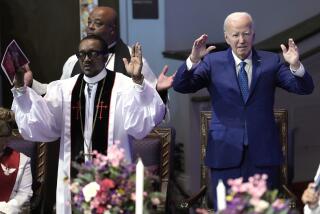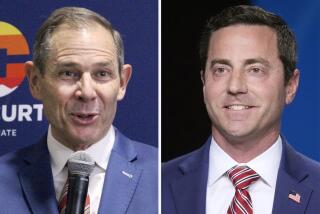Evangelical support grows for Romney
COLORADO SPRINGS, Colo. — Celebration Church sits tucked away in the corner of a repurposed shopping mall, one of the more modest venues for worship in this city of booming megachurches and superstar preachers. It has no cafe, bookstore or multimedia wizardry, but it compensates with warmth, friendliness and an especially erudite pastor who has a day job as an entrepreneur.
Still, the message from the pulpit on Sundays this month is not so different from that being heard in conservative evangelical churches across America. “When you vote,” Pastor Barry Farah tells his flock, “you have to vote responsibly.” And that, he says, means supporting “biblical principles.”
Farah hasn’t endorsed a candidate, nor does he need to. It doesn’t take a theologian or seer to figure out which presidential candidate is closer in line with biblical principles as he describes them — principles that translate into opposition to abortion and same-sex marriage and support for school choice and limited government.
Six months ago, many Republicans fretted that former Massachusetts Gov. Mitt Romney could never appeal to conservative evangelical voters, an essential element of the GOP base. He was a member of the Church of Jesus Christ of Latter-day Saints, considered a non-Christian cult by some evangelicals, and he had a history of taking moderate positions on social issues.
When 150 self-identified evangelical leaders met in Texas in January to decide on a candidate to support in the Republican primaries, Romney — then the front-runner in the campaign — got four votes, according to an evangelical advisor, Mark DeMoss, who cast one of the votes himself.
There are fewer concerns about evangelical support today, even with Romney’s selection of a Roman Catholic, Rep. Paul D. Ryan, as his running mate.
“It’s our belief that the great irony of this election will be [that] you’ll have the first ticket without a Protestant on it, and that ticket will get the highest support by evangelical voters of any ticket in history,” said Gary Marx, executive director of the conservative Faith and Freedom Coalition. “That’s going to be the great irony — supporting a Mormon-Catholic ticket at record levels, and I think that’s already showing up in the polling data.”
Marx may be a bit premature. As of early October, Romney was ahead of President Obama among white evangelical Protestants, 73% to 21%, according to the Pew Forum on Religion and Public Life. That is the same percentage that Republican John McCain captured among white evangelicals in 2008, but below the 79% that President George W. Bush, a self-described born-again Christian, received in 2004.
However, some undecided voters will undoubtedly swing behind Romney, and the Pew poll was conducted before most of his post-debate bump in the polls. So Marx’s prediction is not out of the realm of possibility. Just as important as the percentage of evangelicals who vote for Romney is the number who turn out to vote at all — especially in key swing states where they are a significant force, such as Colorado, Iowa and Ohio.
Here again, Republicans and leading evangelicals say they are optimistic that the turnout will be high.
If so, it will be no accident.
A vast effort has gone into selling Romney to conservative evangelicals, led in part by Marx and his boss, Faith and Freedom founder Ralph Reed, and by such figures as Jim Daly, president of Focus on the Family, and DeMoss, an evangelical publicist who has served as an unofficial liaison between Romney and the evangelical community since before the 2008 presidential campaign.
“A number of us have been trying to shift the conversation from theology to values,” DeMoss said. “I’m more interested in a candidate who shares my values than if he or she shares my theology. And indeed, as an evangelical and a conservative, I have more in common with many Mormons than I would with a liberal Southern Baptist.”
It was DeMoss who helped arrange a meeting this month between Romney and evangelist Billy Graham. That meeting led the 93-year-old Graham, one of the most influential preachers in American history, to effectively endorse Romney — and also led the Billy Graham Evangelistic Assn. to remove references on its website to Mormonism being a cult.
That may be important symbolically. But what the other groups are doing on the ground may ultimately be more significant.
The Faith and Freedom Coalition has set an ambitious goal of reaching out to 17.1 million evangelical households in 12 battleground states to push them to vote. Marx said the group was trying to contact each household seven to 12 times using a variety of techniques, including phone calls, direct mail, email, text messaging, voter guides in churches, radio ads on conservative-skewing stations and personal visits by volunteers.
Focus on the Family’s political wing, CitizenLink, in cooperation with six other organizations, has set a goal of registering as many as 5 million previously unregistered evangelical voters, and is sending out millions of voter guides that compare Romney’s and Obama’s positions on issues of importance to conservative Christians.
“We want to make the records known,” Daly said, “and let you decide which person lines up with your values.”
Not all evangelicals are conservative, and the Obama campaign also has an outreach effort to rally religious voters. But polls suggest that the president will not do as well among white evangelicals as he did in 2008.
The slow economic recovery may be the primary reason. But Obama has also lost support among some evangelicals for his support of same-sex marriage, and for policies perceived to be threatening to religious freedom, including a rule in his healthcare plan that would require some religious institutions to provide contraceptive services to their employees.
Celebration Church members who were interviewed said they planned to vote for Romney in part because they agree with him on social issues, in part because they believe he is best equipped to turn around the economy, and in part because they are unhappy with Obama.
John Chinnock, 62, manager of an environmental cleanup company, said he sided with Romney on social issues but believed the economy was the most important matter in this election. Obama, he said, is trying to make the country more like Europe, “where the government stresses the direction of where the economy is supposed to go.”
Chinnock said he had no problem voting for a Mormon. “Not all the Founding Fathers were Christians,” he said. “Some of them were Unitarians; some of them were Deists. … But they did believe in inalienable rights — that is, rights that come from God.”
mitchell.landsberg@latimes.com
More to Read
Sign up for Essential California
The most important California stories and recommendations in your inbox every morning.
You may occasionally receive promotional content from the Los Angeles Times.





